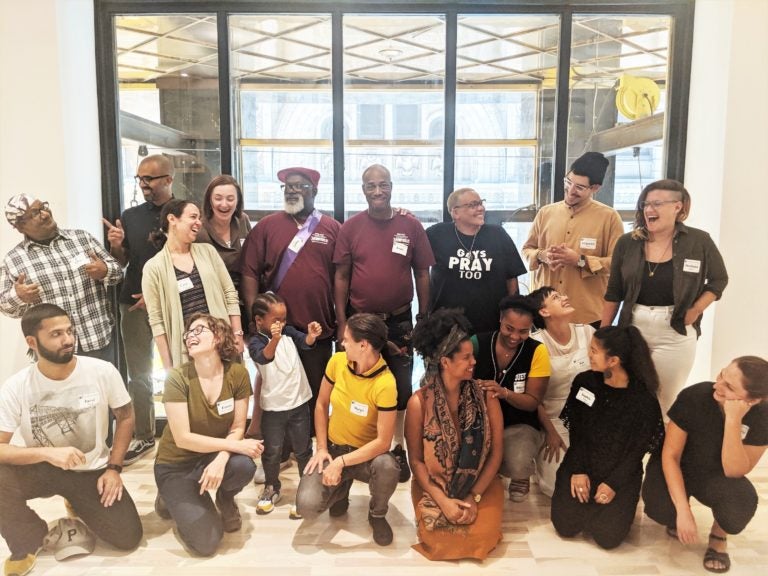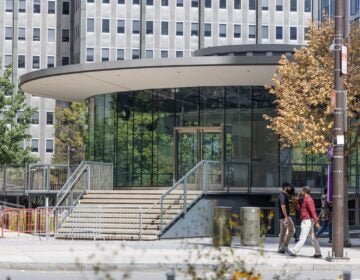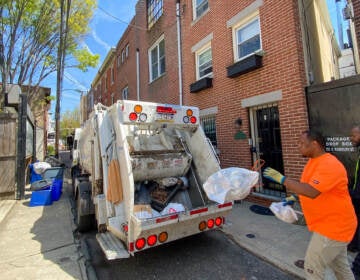Why 18 strangers spent 6 months raising $150,000 for Philly public spaces
The Giving Project brings together people to collectively raise money and then give it away. This week, the group decided how to disseminate $150,000.

A group photo of the 18 people who participated in the Bread and Roses Giving Fund project. (Bread and Roses)
When Meredith Reynolds left Detroit for a job in Philadelphia four years ago, she was eager to recreate the circle of like-minded, socially conscious friends she’d left behind.
Her search for a new, civically engaged network eventually led her to the Bread & Roses Community Fund, a social justice fundraising organization based in Center City. She joined its Giving Project and spent six months talking about race and class and movement-building with 17 other participants, before helping decide how to give out hundreds of thousands of dollars in grant funding.
“I was trying to find a way to learn more about the city in a way that felt meaningful and true to me,” said Reynolds, who works as a digital project manager at a web design firm. “The Giving Project seemed to be a way where I could meet folks in the city that were doing on-the-ground social justice work and were equally as passionate as I was, but where I also could raise money and do something meaningful with that.”
Reynolds and her fellow fundraisers-in-training had their culminating session last month and Bread & Roses announced the selected grantees this week. The 20 grants will go toward supporting equitable space projects in the city, such as a garden used for Asian-American cultural events, park and library programs for African and Caribbean immigrants, and a neighborhood marketplace in North Philadelphia.
The day-long meeting at the Bread & Roses office on South Broad last month was an occasion for both making final grant decisions and reviewing the group’s six-month journey of bonding and learning together. With prompting from two facilitators, and occasional bursts of emotion, the participants sat around a long table talking about the stresses of asking friends and family members for donations, and the joys of supporting each other in their shared drive to create a more just and equitable society.
“Two words come to mind for me right now, and that’s radical love, right? I say radical love because I feel that in this space, I felt upheld, even when we were separated by miles. I feel that right now in this room,” member Imrul Mazid told the group.
“I feel that because Malcolm X’s martyrdom’s 55th anniversary was yesterday, and this organization is truly channeling that spirit of radical love. Huey P. Newton, his birthday just passed. This organization is tied to that history; we’re a part of that history. And I’m very grateful for that,” he said.
Other members of the group said the months of meetings showed them a powerful model for what society could look like, with people of different classes, races, and ages working together, sharing responsibility for decisions and making themselves vulnerable to each other.
Along with fundraising lessons and encouragement, they received training on the history of race and class in America and social justice issues in Philadelphia and nationally, they said.
As part of the discussion, they talked about how their individual racial and economic backgrounds shaped the way they relate to others, think about social justice, and approach fundraising. At the meeting last month and in previous sessions, they broke into “race caucuses,” with the people of color in one room and the white participants in another.
Bread & Roses executive director Casey Cook said the caucuses are an important tool in promoting anti-racism in social justice movements.
“All of us in this country are socialized into white supremacist culture. We have to actively work against those characteristics and tendencies in each of us,” Cook said. “Especially as white people, we have a lot of unlearning to do. To do it with people of color creates a burden for them. When they already live in a racist society, that creates enough of a burden. So in trying to undo that, we don’t have to create additional burdens for them.”
Bread & Roses has been making grants for more than four decades and running Giving Projects since 2016, but this year’s grantmaking will play out differently than in past years. Not only did the participants meet their $150,000 fundraising goal, but the William Penn Foundation double-matched the funds, giving the group a combined $450,000 to grant out to organizations working on “equitable spaces” projects in Philadelphia. (The William Penn Foundation also supports WHYY.)
“We’ve been thinking about hundreds of thousands of dollars, which is incredible, and now we have almost a half a million dollars to give out,” Emma Fried-Cassorla, a Giving Project member and creative director at the Delaware River Waterfront Corporation, said to the group. “It’s a huge responsibility, but also just an amazing accomplishment.”
The grant recipients include Soil Generation, a 7-year-old coalition of urban farmers and community-based organizations that helps black and brown Philadelphians secure control of land for farming and gardening. Soil Generation, which has received funding previously from Bread & Roses and the William Penn Foundation, was awarded $50,000 over two years, the largest of this year’s grants. Two other groups, Urban Tree Connection and VietLead, are each receiving $30,000 over two years while the other grantees will receive $30,000 or $20,000 over the same period.
The recipients include Asian Americans United, Black and Brown Workers Cooperative, Coalition of African Communities, Cooper Grant Neighborhood Association and Concerned Citizens of North Camden, Healing Communities USA, MOVES, Mt. Vernon Manor CDC, National Institute for Healthy Human Spaces, Inc and William Way LGBT Community Center.
Also receiving grants are Norris Square Community Alliance, One Art Community Center, Philadelphia Black Pride, Poor People’s Economic Human Rights Campaign, Senior to Senior Community Outreach, Spiral Q, UC Green on behalf of Holly Street Neighbors Community Garden, and Urban Creators.
Soil Generation executive director Kirtrina Baxter said her organization may use the grant funding to help groups of residents buy land or to fund its general advocacy work as it crafts a plan to preserve threatened urban farms. In November the city launched its first urban agriculture initiative and selected Soil Generation and Interface Studio LLC to lead the planning process.
Baxter has participated in a Giving Project herself and said Soil Generation is enthusiastic about the grassroots model that puts residents in charge of fundraising and selecting grantees. Similarly structured charitable efforts sometimes called giving circles, have been shown to encourage participants to give more, to give more strategically and to support women and people of color more often.
“Across the country, people are looking at it strategically as a way to encourage everyday folks to be able to have the opportunity to shift funds in their community in the ways they think are important, outside of just some folks in the boardroom who don’t really know what’s happening on the street or at the community level,” she said.
Bread & Roses has throughout its history funded radical, politically active organizations that might not be considered for grants from large foundations, such as the Black Panther Party, ACT UP, activists who created the city’s public access TV channel, and a committee that sued Sunoco over oil refinery pollution. The organization’s co-chair Jennifer Jordan has argued that professional charitable organizations funded by wealthy people keep “all the power in the hands of the donors,” doing “anticapitalist work dependent on capitalists” that “does nothing to address” social inequality.
But that stance did not keep Bread & Roses from partnering with the William Penn Foundation. The foundation, one of the largest in Pennsylvania with $2.3 billions in assets, is a traditional philanthropic organization created by the owners of Rohm and Haas, now part of Dow Chemical.
One of the foundation’s focus areas is fostering equity in public spaces by centering on residents’ involvement, both in fundraising and the spaces themselves, said Cara Ferrentino, a program officer at William Penn.
“Supporting a Giving Project is really a great opportunity to really focus on that idea of direct resident participation in public space, because of Bread & Roses’ very explicit focus on supporting grassroots organizing toward their goals of racial, economic and social justice,” she said.
Ferrentino said William Penn has for decades supported public spaces like parks, libraries, trails, community gardens, and plazas, and made that an official focus in its most recent strategic plan in 2012.
Bringing residents into the grantmaking process is resource-intensive, costing Bread & Roses $75,000 to organize and run each six-month Giving Project, Cook said. But she noted that each project has raised at least $150,000 in new donations and said the fundraising efforts have different long-term benefits to society than traditional philanthropy.
“What we don’t see immediately is the movement-building that the Giving Project itself is doing,” Cook said. “This group raised donations from 366 people. That means they had at least 366 conversations about social justice in Philadelphia, about anti-racism, about equity and justice, about community involvement in policymaking. Also, they have gained incredibly valuable skills in fundraising.”
“Each of these folks is leaving here with a tool bag that they can use in their own community organizing and in their own movement building,” she said. “That is absolutely invaluable.”
 WHYY is one of over 20 news organizations producing Broke in Philly, a collaborative reporting project on solutions to poverty and the city’s push towards economic justice. Follow us at @BrokeInPhilly.
WHYY is one of over 20 news organizations producing Broke in Philly, a collaborative reporting project on solutions to poverty and the city’s push towards economic justice. Follow us at @BrokeInPhilly.
WHYY is your source for fact-based, in-depth journalism and information. As a nonprofit organization, we rely on financial support from readers like you. Please give today.







